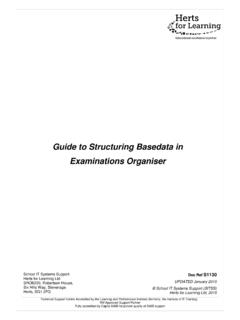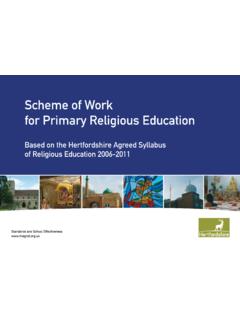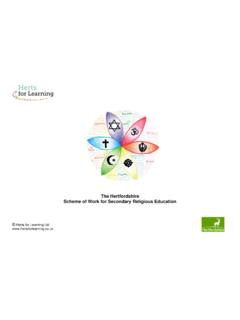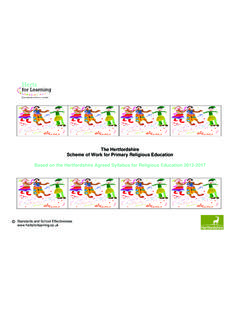Transcription of New Arrivals in Secondary Schools: Induction Pack Part 1
1 Supporting the education in school of children who are looked after who have English as an additional language New Arrivals in Secondary Schools: Induction pack part 1 Guidance on Admission, Induction and Teaching Strategies Children s Services Tel: 01992 556915 Fax: 01992 588512 1 CONTENTS INTRODUCTION New Arrivals in context: a range of experiences .. 3 Self esteem .. 3 New Arrivals in school : practical considerations .. 4 Being valued: comments from newly-arrived students.
2 5 ADMISSION TO school The Admission meeting .. 6 After the meeting .. 7 Actions before the first day .. 7 On the first day .. 7 During the next few days .. 8 Evaluation and review of the settling-in phase .. 8 Ongoing support .. 8 Ongoing monitoring of the child's social and emotional needs .. 9 The buddy team: organisation, reporting and monitoring .. 9 Support from the pupil s peers .. 10 Support from the Form Teacher .. 10 CLASSROOM STRATEGIES Becoming part of a learning community .. 11 The impact of cultural differences.
3 11 Strategies to support newly-arrived students in class .. 12 Classroom strategies for use with beginners in EAL .. 13 Top teaching tips for use with EAL beginners .. 15 USEFUL MATERIALS Books and photocopiables .. 16 Resources on the internet .. 17 Educational suppliers: multicultural resources .. 18 APPENDIX: ADDITIONAL NOTES Notes for the Form Teacher .. 20 Notes for all staff: protocols relating to sensitive and confidential information .. 22 Notes for the Senior Leadership Team: Admission and Induction procedures.
4 23 Notes for Governors .. 25 2 3 INTRODUCTION New Arrivals in context: a range of experiences Every young person s situation is unique and it is important not to make assumptions. Some young people may never have been inside a school before coming to the UK. They may have had little or no education, or they may have been educated at home by family members or by tutors. Some children may have had their education severely disrupted by war or violence and displacement; this may have resulted in very little coherent understanding.
5 Others may have been victims of discrimination and they may have been denied education altogether. Considerable patience and understanding may be needed while such children adjust to being members of the school community. Others may have had experience of styles of teaching that are highly formal in content and presentation; they may be unprepared for group work, class discussion and the informality of UK classrooms. They may be used to a formal setting with methods of punishment which would not be found in UK schools.
6 Independent research skills may have to be taught because pedagogical methods in schools in some countries depend to a great extent on transmissive methods and learning by rote. They may have a good knowledge in some areas of the curriculum (maths, for example) but they may be completely unfamiliar with other subjects. Many possess considerable ability and they are highly motivated to learn. Language skills may not be uniformly developed: some students find conversation difficult but their understanding of written text may be more advanced.
7 Such students may have difficulty with imaginative tasks, group discussion and informal work. There may be considerable frustration because of the difficulty in expressing views and opinions in an unfamiliar language. Other new Arrivals may speak volubly but inaccurately and they may have little or no experience of reading or writing. A small number of children from other countries are not functionally literate in any language. They may lack fundamental knowledge of curriculum subjects. These children may need extra time to acquire basic proficiency in oral English before they are ready to start on reading and writing.
8 For them, inclusion in the mainstream may not be enough; they may need additional individual tuition ideally on a daily basis in order to master the essentials of language. Praise, encouragement and confidence-building experiences are needed to maintain the pupil s commitment to learning. Careful differentiation in lessons plus withdrawal from specific subjects (for example, modern languages) may be needed in order to assist the student s progress. Self esteem Nurturing young people s self esteem is critical in order to promote a positive attitude to learning and to encourage them to believe that they can succeed.
9 Researchers recommend that strategies are planned specifically to raise the pupil s self-esteem; research projects have shown that healthy self-belief reduces the risk of anger and aggression developing in young people who struggle with the difficulties and frustrations of their situation. Art and drama therapy have also been shown to be beneficial in such circumstances. 4 Some young people have abilities and talents in practical, expressive or artistic areas and staff are encouraged to be watchful for signs of any ability which may be acknowledged and celebrated.
10 If the student is happy for attention to be drawn to his or her ability, their confidence and self-esteem may be boosted by giving them the opportunity to share it in some way with others. Assemblies provide a natural focus for celebrating talents and for marking special cultural events. Some schools make approaches to community and religious leaders and involve them in celebrations, and these events help new Arrivals to feel valued by the school community. New Arrivals in school : practical considerations Even for pupils who have had regular schooling previously in their country of origin there will be much that is unfamiliar in a UK Secondary school .














